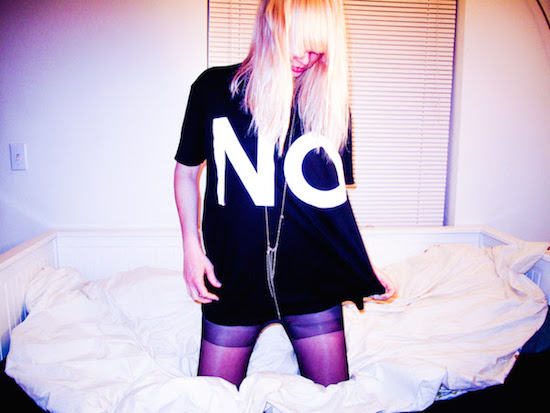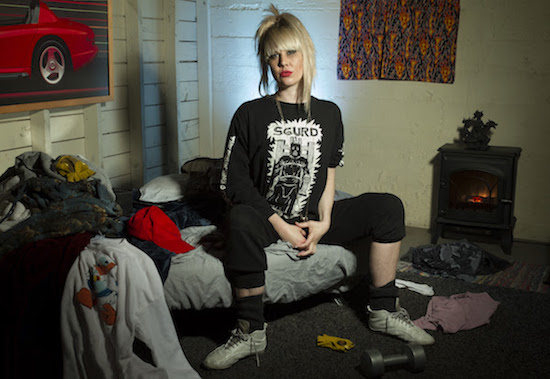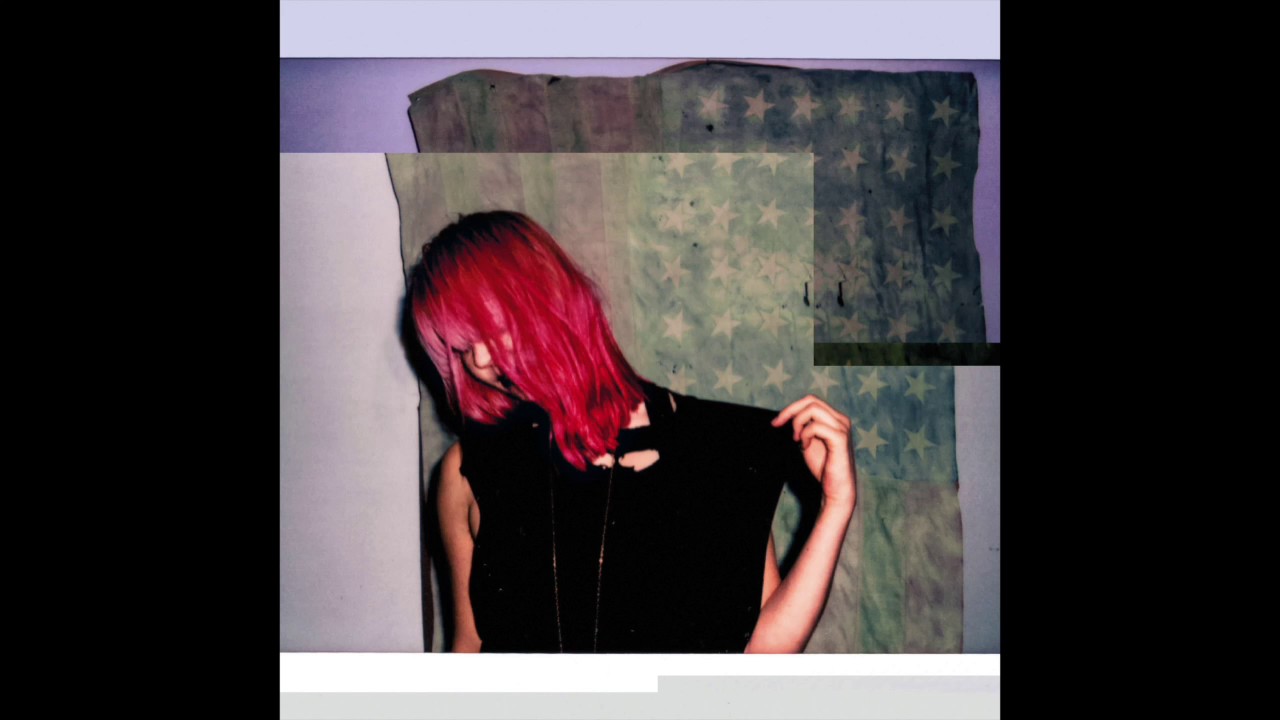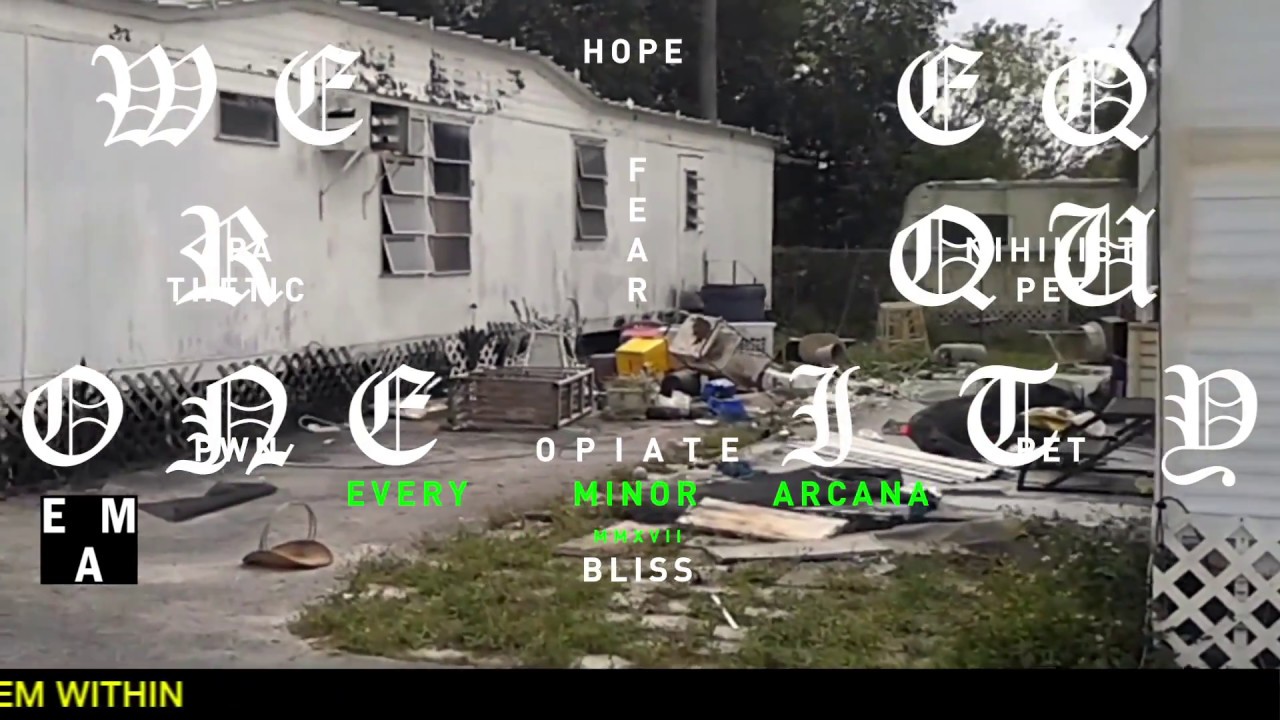In the 2016 US Presidential election, Donald Trump won 61 per cent of the vote in the mid-west state of South Dakota. This was not a surprise – South Dakotans had backed a Republican candidate since 1968. South Dakota is a ‘red’ state. Erika M. Anderson hails from Sioux Falls, South Dakota, but for the past few years has resided in Portland, Oregon on the US Pacific Coast. In Portland’s county – Multnomah – Hilary Clinton bagged over 73 per cent of the votes last November. Portland is a ‘blue’ city.
It’s the tension between these two versions of America – the ‘liberal coastal elite’ and the ‘middle American’ – that inspired much of EMA’s third album, Exile In The Outer Ring. It’s a staggering record, fuelled by class alienation, male rage as a society teeters on the verge of an implosive collapse. It’s an album of heavy drones, self-loathing and Erika’s gloriously twisted wit and feels like a sonic monument to the current fucked-up status of America in 2017.
However, Exile In The Outer Ring is a record aiming to build bridges. Amid all the dystopic energy lies a sliver of hope in the place EMA defines as the ‘outer ring’. According to Erika, this zone is where the two ‘Americas’ collide. It can be found at the periphery of cities that have become too expensive for most, and it’s where the jobless from the countryside come to find a new life. It’s a mass of faceless strip malls, vape shops and drive-thru fast-food joints and the good news is that the outer ring is culturally diverse, community-focussed and, as Erika tells me, is where all “the weird shit is going down.”
It’s a place that suits Erika perfectly. She is still a mid-westerner at heart, but left Sioux Falls in part to remove herself from the suffocating misogyny of the town’s punk rock community. We’ve spoken before about her formative years (in an interview with fellow mid-westerner, Zola Jesus, in an article titled ‘Empathy And The Red States’) and I’ve witnessed Erika visibly prickling at the lazy ‘racist rednecks’ stereotypes bandied around by the coastal chattering classes.
I have interviewed Erika several times since a first meeting 2011, in the disused, top-floor storeroom in Salford’s Islington Mill. She was touring her astounding debut album Past Life Martyred Saint and told me a terrible joke about an alien mattress salesman. Our most recent conversation was over a Skype video link for a tQ feature about her 2014 album, The Future’s Void, a visceral and intense set of songs exploring online abuse, digital surveillance and media wrath. When we spoke, Erika was agitated and withdrawn. “I was thinking about the last time I talked to you,” Erika tells me, when we catch up to discuss Exile In The Outer Ring via another Skype video. “I was a wreck and I was fucked up. I was not in a good place.” This interview is very different.
Although I ask her some preposterous questions – Erika has virtually “fixed America” by the time we are done – she is on fine form and impassioned about an alternative vision for her wounded, flailing country. Exile and a desire to build bridges clearly suit EMA.
Congratulations on the new record. Three albums in, how close are we getting to the core DNA of EMA?
Erika M. Anderson: Well, I think I have done a pretty good job at being me on this record. It has all the things that I am interested in for as long as I have been making music – heavy drones, folk melodies, feedback and riffs. It’s my language.
Thinking about the album title, can you give me an insight as to what you mean by the phrase ‘outer ring’.
EA: The ‘outer ring’ is a term I came up with. It’s the estuary between where the people who are being forced out of the cities, due to being economically disadvantaged, meet with the people who having to leave the countryside in order to get jobs. It has its own vibe and culture. And, where that place exists, is at the outer ring of a city. A lot of my work has been about spiritual transformations taking place in prosaic places. The outer ring to me is mess of chain stores and nondescript architecture, but also containing many super-unique elements – the people. When I go to a city now, a lot of them are just all much of a muchness, with a culture and an aesthetic that makes them virtually identical. The fact that only wealthier people can live in the city, means they have become sterile. They all have the same kind of shops, bars and restaurants – you could be in New York, London or Portland. Cities should be vibrant with culture – and they still do house all of the cultural institutions – but I think the outer ring is the place where the weird shit is going down.
I’m also interested in a quote from the press release for this album, in which you describe your teenage self as a ‘socialised male’. What did you mean by that phrase?
EA: In my home town, any art or culture or anything interesting that was going on was strictly a boy’s club. Punk rock was the main art. There were definitely no girls that were playing music. I was the first woman to front a band in Sioux Falls. Even music fandom, if you wanted to hang out and learn about any of this stuff, all the people who were doing cool shit were dudes. They were also gnarly scumbags, but they were the people I had to learn from.
What impact did that have on you?
EA: Well, there are a couple of places on this record where I was going for a Guns N’ Roses vibe. It was me thinking about being six years old and getting the Appetite For Destruction tape and it containing a painting of a crumpled little girl who has just been raped by the huge robot. So, what did that do to me? I was taking in all of this culture – the rage and the rebellion – and it was all very male. When you are reading [Charles] Bukowski as a 12-year old girl, what does it do to you? Of course male rage is not hard to understand. It is everywhere. There are so many movies, so many books and so many songs that are fuelled by male rage. I have had to deal with male rage literally; by having crazy boyfriends who would destroy shit. I feel like I understand it. There is part of me that has been taking it in – artistically – for years, by observing, and then making something out of that rage.

The album explores some of the rage that fuelled the Presidential election. Why do you think that Trump was able to tap into so much frustration and anger?
EA: All the songs on this record were written before the US Presidential election. I think that one of the things I was tapping into, subconsciously, was a resentment of the ‘liberal coastal elite’ in America. I don’t know how to speak to the racism aspect [of Trump supporters] – that’s a whole different discussion – but there is a resentment and rejection of liberal culture. That culture is not available to many people in America. And the liberal coastal elite, who may never have been to rural America, just think everyone there is racist and homophobic and judge them to be terrible people. They think there is nothing wrong to be making jokes about ‘meth heads’, who are actually a group of people with poverty-related drug issues. They don’t see their own hypocrisy. I think this is a huge issue and one that cannot be ignored. Also, there is a dismissal of certain aspects of liberalism – an almost wholesale rejection of multiculturalism and globalisation.
You are from South Dakota and I remember the article we did for tQ with Zola Jesus was entitled ‘Empathy For The Red States’. I am assuming you empathise with the demographic so reviled by the ‘liberal coastal elite’?
EA: I can pick up on that. I have a bit of that resentment. I can go a fancy bar or a boutique and it flips a switch in me, even though I have been living on the coast for a long time. I can still feel it, even if I haven’t been back home for a while. Having said that, I didn’t really see Trump coming because he is such a conman. I could see the anger and a desire to say “fuck you” to the establishment and to the liberal elite, but how could you vote for a person who is a sleazy, New York City real estate mogul? It’s beyond me.
Let me push you a little bit. While I understand your empathy, is it not true that there are many people in the Red States that are racist and homophobic and how do you square that away?
EA: Okay. I have a lot of thoughts going on. As for how to defend folk back home? I have been recently reading a lot about racism in America and the aspect that I can talk to and experienced when I was growing up in South Dakota, was about racism being linked to misbehaviour and shock value. I remember being in first grade and a kid carved a swastika into his desk. The teacher was so upset and the kid was getting into huge trouble. None of us knew what it meant at that point – I didn’t know and the kid didn’t really know. He had no history of World War Two – he just knew it caused a huge reaction. I think that is something I saw – kids being rebellious. That’s being going on forever. I was reading some stuff about the alt. right and some of them are these children – who now have grown up and want to say the craziest things and make the most offensive memes. So, there is an aspect of that, which I remember as a kid. People would say racist shit and I would be like “Dude, we are in South Dakota and everyone is white and you are obviously ignorant – you literally have no clue what you are talking about at all.” All they knew is that it would evoke a reaction. So, I had experience with this, when I was hanging out with some of the teenage scumbag boys. I don’t have experience of actual hate crimes or of people who make that jump from saying stupid shit for shock value to piss people off, to the violent actions. I didn’t grow up with that. I have no understanding of that. I don’t know what that’s about or how people can get that way. And, I don’t know what to do about it.
Don’t worry, I’m not asking you to cure racism.
EA: It’s frightening. There were people murdered recently on a train in Portland. It’s insanity.
Have you a sense of what it means to be an American in 2017?
EA: This is the thing. I feel like an American and all this shit makes me want to reclaim it. I was so pissed when a group of people decided they were more American than I was. I don’t believe any of the bullshit they try and put under the umbrella of what it means to be ‘American’. Since when has America just been about white people? We are all fucking immigrants – what are they talking about? So, I definitely want to reclaim what it means to be American. Right now, the concept has been trashed.
How would EMA reclaim America? Sorry, that’s a deeply unfair question.
EA: No. Let me think about this. What would I reclaim America as? I do want it to be a diverse country. As I am talking to you, I am thinking that the reason the outer ring might work as a place of unification is because its signifiers of geography are neutral. It has a neutral aesthetic – it is chain stores and parking lots. It’s not the city with its dark wood espresso shops or the country with its dive bars. I don’t know how to fix the cities and make affordable housing in the city. It seems pretty fucked – cities seem like places people visit but not anywhere that anyone could live. They don’t feel vibrant or integrated and interwoven anymore. The only thing I can hope for is some sort of suburban utopia. Isn’t that what everyone at some point desires? Didn’t America invent the suburbs?
Can you define your ‘suburban utopia’?
EA: The suburbs have always been like an American version of utopia and a reflection of their hopes and fears. Erika’s version of American suburban utopia – which I am renaming the outer ring – is a diverse place, with affordable housing, the possibility for people to have small businesses (which is more realistic in the outer ring than in the city with its huge costs), decent public transportation and the ability to access art and cultural events. That’s my dream for America.
I think you might have just fixed America. Finally, is Exile In The Outer Ring a hopeful album?
EA: Well, you can always accuse my records of being harrowing or dark or bleak. There is processing of trauma on my records and I think my music does contain a lot of healing. As a person who has been watching other’s rage for years, instead of having my own tantrums, I keep the feelings inside until I can find a way of making them into music. The songs are like healing spells and it really works for me. When I really do a good job on a song, it gets rid of a weight. So, as far as hope goes, there is hope that you can heal through processing stuff and make it through to the other side. I think that’s all I can hope for.
Exile In The Outer Ring is out on August 25 via City Slang.





